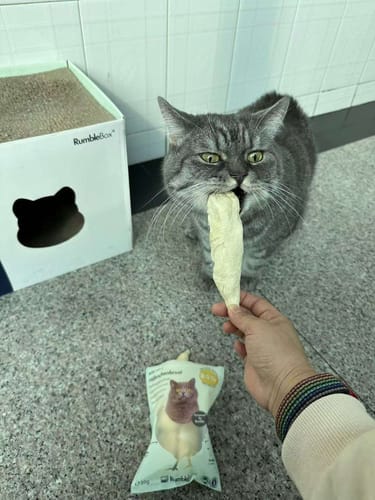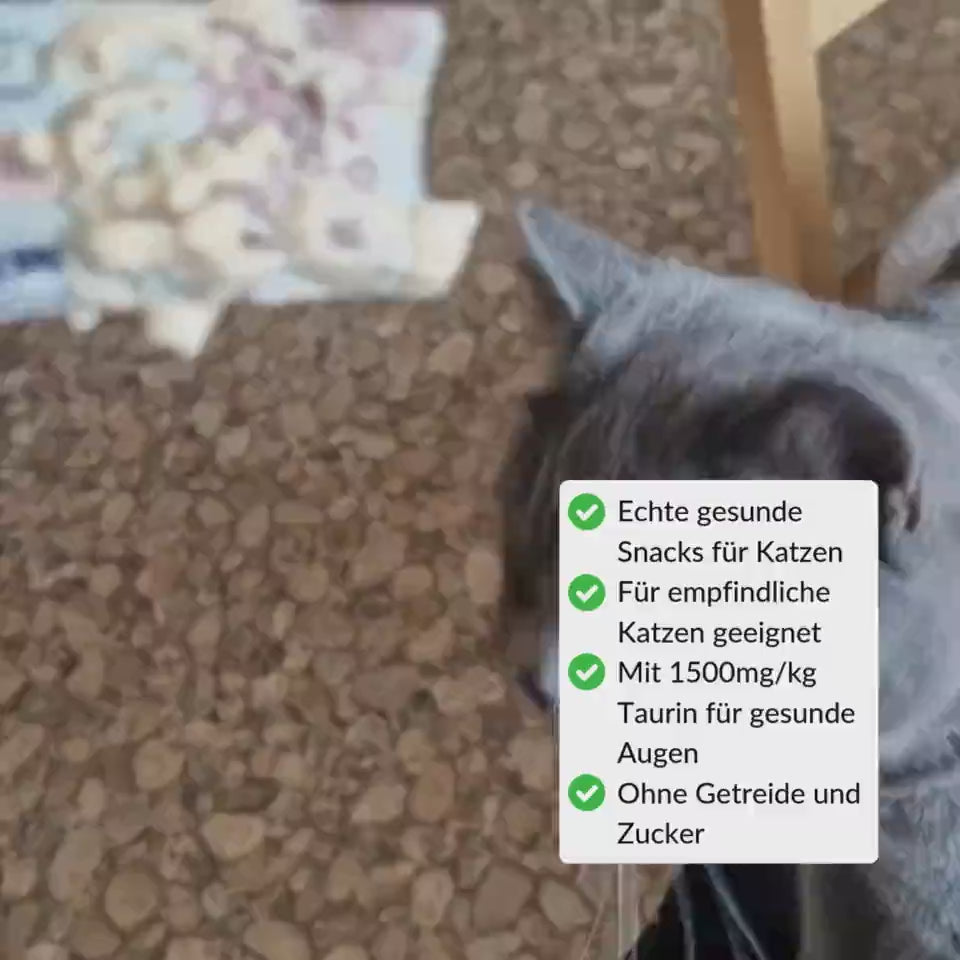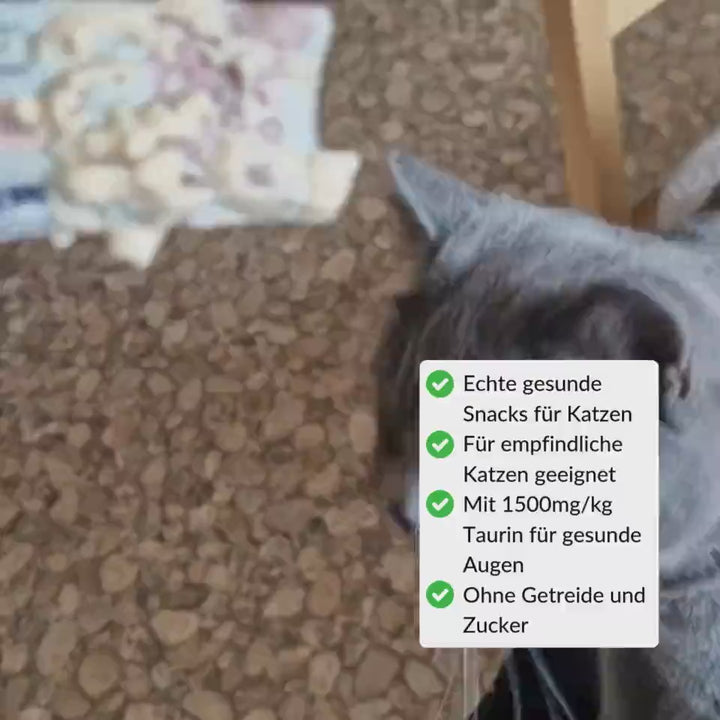Cat Profile: Important Facts & Tips
Table of contents
Profiles of the cats in table form
feature |
details |
Scientific Name |
Felis silvestris catus |
Weight |
2 - 10 kg, depending on the breed |
life expectancy |
12 - 16 years (indoor cats often older) |
sleep behavior |
12 - 16 hours daily |
Natural enemies |
Larger predators, birds of prey, cars |
coat colors |
Solid, tabby, spotted, multi-colored |
Teeth |
30 teeth (adults) |
| number of vertebrae |
Approx. 50 vertebrae, particularly flexible |
body temperature |
38 - 39.2 °C, higher than in humans |
reaction time |
20 - 70 milliseconds, extremely fast |
jumping power |
Up to five times your own body height |
jaw strength |
Up to 56 Newtons, strong enough to catch prey |
Eyes |
See 6 times better than humans in the dark |
ears |
Can rotate up to 180°, controlled by 32 muscles |
sense of touch |
Vibrissae (whiskers) help with navigation & hunting prey |
Did you know? The oldest cat in the world lived to be 36 years old! The largest domestic cat is the Maine Coon, which can be up to 123 cm long.
Cat Behavior: How Your Cat Ticks

Cats can be very independent. But they also show a lot of affection. Their body language reveals their mood:
Purring → relaxation or self-soothing
Meowing → communication with people
Tail wagging → anger or insecurity
Ears back → discomfort or fear
Headbutting → affection & territory marking
Cats are not always loners. Indoor cats are often more sociable. Some breeds, such as Siamese cats or Ragdolls, seek proximity to people.
Nutrition: What your cat eats

Cats are carnivores . They need animal proteins to stay healthy.
❌ Cats are not allowed to eat this
dairy products 🥛 → Many cats are lactose intolerant
onions & garlic 🧄 → Harmful to your blood cells
Chocolate & Caffeine 🍫 ☕ → Toxic to the nervous system
Raw pork 🥩 → Danger from viruses
Alcohol & Avocados 🍸🥑 → Very dangerous
👉 Read more in our article: What shouldn't cats eat?
✅ Healthy nutrition for cats
Prefer high-quality wet food
Always provide fresh water
Occasionally cooked chicken or fish

A cat fountain can help cats drink more.
Reproduction & Raising Kittens: Important Facts
Cats reproduce very quickly. Therefore, castration or sterilization is important to prevent uncontrolled reproduction.
pregnancy and birth
Gestation period: approx. 63 – 67 days
Litter size: 2 – 8 kittens
Birth: The mother looks for a protected, warm place
Breeding: The kittens are born blind & deaf and are nursed for about 8 weeks

After 12 – 15 weeks, the kittens are ready for a new home. Separation too early can lead to behavioral problems.
👉 More about the right diet for kittens: Amount of food for cats: How much food does your cat need?
Fun Facts: Surprising Facts about Cats
😲 Did you know that…
Cats can sweat 💦 → But only on their paws! That's why they sometimes leave small wet prints.
Unique nose print 👃 → Every cat has an individual nose print – just like people have their fingerprints.
Can perceive electrical fields ⚡ → Cats sense electrical vibrations and can detect whether an electrical device is switched on.
Cats sleep a lot 💤 → Up to 16 hours a day ! That makes them real sleep masters.
Super-fast reflexes ⚡ → Cats can react in a fraction of a second. Their reaction time is only 20 milliseconds.

The largest domestic cat in the world 🏆 → A Maine Coon named “Stewie” reached a length of 123 cm !
Treading like kittens 🥰 → When cats knead soft surfaces with their paws, it is reminiscent of the milk-treading behavior from childhood. It shows relaxation and affection.
Cats have a built-in compass 🧭 → They can often orient themselves over long distances and find their way home.
Why do cats love boxes? The secret behind their behavior
Almost every cat owner knows this: As soon as a box is in the house, the cat is already sitting in it!
📦 Why do cats love boxes?
Safety & Protection – ideal retreat
Storing body heat – cats like it warm
Perfect for playing & hunting – surprise effect
Stress relief – cardboard boxes help cats feel more relaxed

Make your cat a cardboard cave – cheaper than any designer cat bed! 😻
Care & Health: How to keep your cat fit
Cats are very clean animals. They groom themselves every day, but they still need help with grooming. A clean litter box is a must, and regular brushing removes loose hair and prevents matting - especially in long-haired cats.
🐱 Indoor cat:
✔ Needs scratching posts, toys and hiding places for exercise and mental stimulation.
✔ Should be given new stimuli regularly to avoid boredom.
✔ Needs to be activated more through play as she hunts less.

🌳 Outdoor cats:
✔ Has more exercise and can live out their hunting instinct.
✔ Is exposed to risks: road traffic, diseases, parasites, other animals.
✔ Should be chipped and neutered to avoid getting lost or breeding uncontrollably.
Health Tips for a Long Cat Life
Regular visits to the vet are essential to detect diseases early.
✅ Annual health check → Checking teeth, coat, weight and general condition
✅ Vaccinations & deworming → Protection against dangerous infections and parasites
✅ Dental check-up → Many cats suffer from tartar and gingivitis
✅ Keep an eye on your weight → Being overweight can lead to diabetes and joint problems

💡 Tip: Cats often show pain late. Pay attention to changes in behavior, appetite or coat condition!
👉 More on weight control: Overweight cat: How to keep it fit!
The intelligence of cats: how smart are they really?
Cats are smart! They learn through observation, experience and memory . Their intelligence is different from that of dogs. They think independently and make their own decisions.
🧠 How intelligent are cats?
Recognize their name 🏷️ → They know when you call them. They decide for themselves whether they respond.
Learning through imitation 👀 → They observe people and animals and copy their behavior.
Understanding routines ⏰ → They remember when it’s time for food or when you come home.
Solve problems 🧩 → They find ways to get treats or into cupboards.
Benefit Tricks 🎭 → They meow in certain tones to get your attention.

🏆 Are cats smarter than dogs?
This is a question that is often asked. Dogs have more brain cells, but that doesn't mean they are smarter.
- 🐶 Dogs → Learn many words, are easy to train, and are focused on people.
- 🐱 Cats → Think independently, solve problems alone, are adaptable.
Both animals are intelligent in their own way!

🎭 Do cats feel emotions?
Yes! Cats sense your mood. They notice when you are stressed or sad.
- They snuggle up to you when you need comfort.
- They come to you when you relax.
- They ignore you when they notice that you are busy.
Cats are curious but cautious. They explore their surroundings carefully, but don't like change. This mixture of spirit of discovery and distrust makes them unique - independent, but still connected to their people. 😺💕
Thank you for reading this far – it really means a lot to us! We hope you found something useful and maybe your cat is already looking forward to a little something extra. See you soon and lots of purrs!
By the way
Many cat owners pay close attention to the ingredients in their cat's main food , but often forget about treats .
Snacks often contain sugar, grains and artificial additives that can be harmful to health in the long run.
Anyone who truly wants to feed their cat a completely healthy diet should also rely on natural ingredients here:
Hypoallergenic treats without additives – naturally from RumbleBox. Perfect as a reward, during training, or simply as a snack.
Over 2,500 cats have already switched to healthy snacks!
💚





























